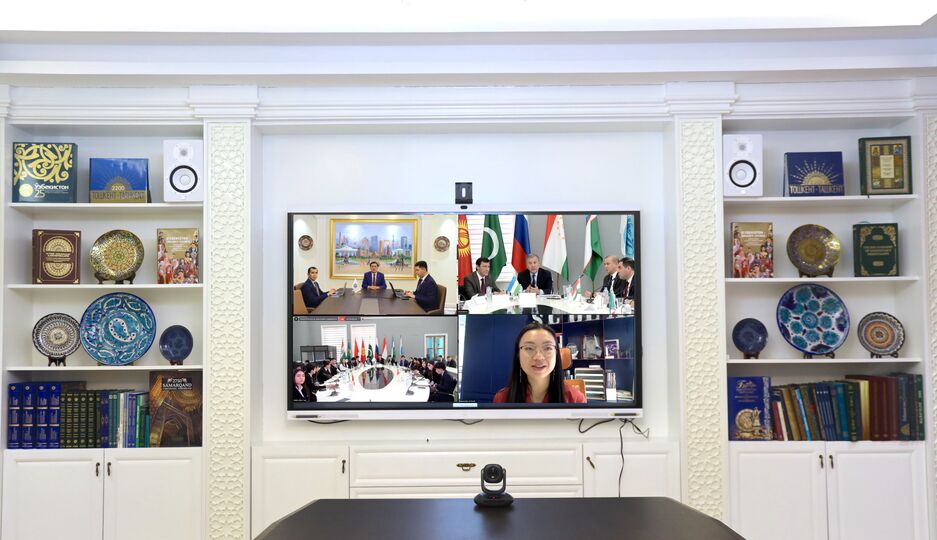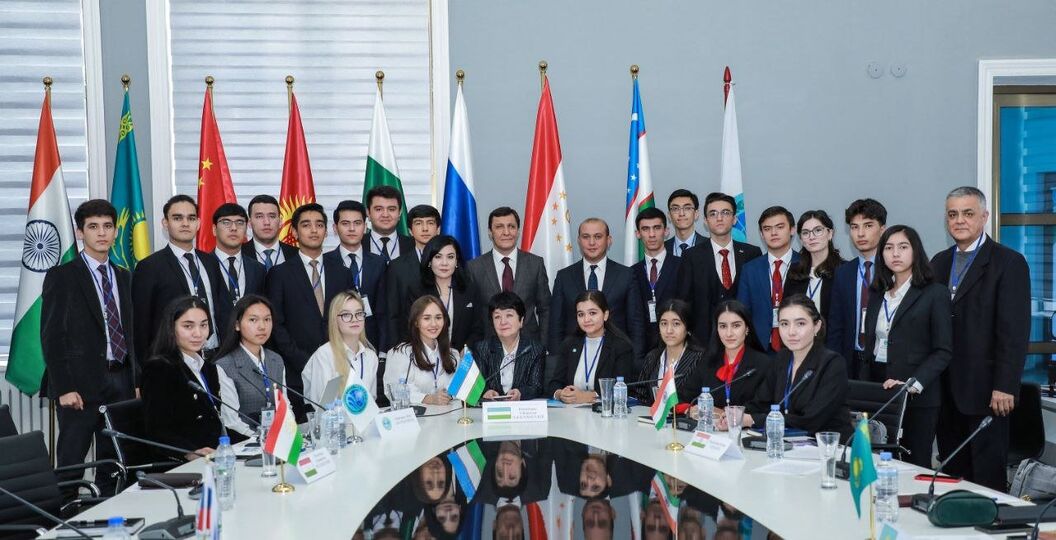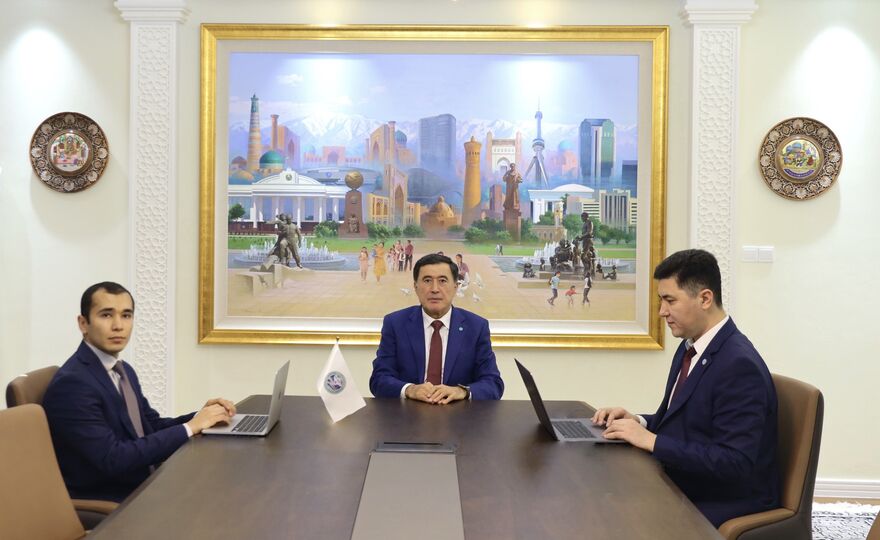The University of World Economy and Diplomacy in Tashkent hosted the eighth Model SCO interactive game on 11 November, 2021, held as part of Uzbekistan's SCO Presidency. Its topic this year was "Peace and prosperity in Central Asia: The main stability factor for the entire SCO space." Devoted to World Youth Day, the event took place in a hybrid format, blending online and offline formats.
The SCO Centre for Public Diplomacy in Uzbekistan, SCOLAR Network SCO Youth Platform and the University of World Economy and Diplomacy acted as the project organisers, with support from the SCO Secretariat.

The Model SCO's main purpose is to encourage young people to take an interest in the SCO's work by modelling high-level political debates among the SCO member states. This eighth edition modelled the SCO Heads of Government Council, one of the organisation's main bodies, helping young participants gain a deeper insight into the SCO's functioning and work. In the model, 22 students from the University of World Economy and Diplomacy acted as delegates of the SCO member states and Secretariat staff.
In his greetings to the participants, SCO Secretary-General Vladimir Norov thanked the organisers and said that Model SCO has become a regular event that expands its geography every year to include more countries, cities and educational institutions. He went on to emphasise that this year's topic was highly relevant, since the SCO heads of state have underscored in several declarations the importance of Central Asia for the Organisation and their commitment to promoting stability, security, sustainable development and shared prosperity across the region. For this, it will be essential to achieve peace and facilitate socioeconomic development in Afghanistan, Mr Norov pointed out. It is for this reason that the SCO supports comprehensive efforts undertaken by countries in this region to draw Afghanistan into regional trade, economic, transport and infrastructure projects.
Mr Norov said that youth policy was one of the SCO's top priorities for enabling the young generation to develop physically, intellectually and spiritually, and engaging young people in major development projects. He noted that in the Dushanbe Declaration on the Twentieth Anniversary of the SCO the leaders stressed the importance of promoting youth entrepreneurship and offering targeted capacity building programmes for young entrepreneurs on economic activity across the SCO space. To implement the Dushanbe Declaration and Uzbekistan's plans as part of its SCO Presidency, the Secretary-General proposed establishing a volunteer division within the University of World Economy and Diplomacy to work with delegations attending SCO events during Uzbekistan's Presidency.
In conclusion, he wished delegates every success and expressed confidence that participants would come up with practical proposals that would benefit the SCO.
First Deputy Speaker of the Senate of the Oliy Majlis of the Republic of Uzbekistan, Rector of the University of World Economy and Diplomacy Sodyq Safoev also greeted the participants. In his remarks, he noted that the SCO plays an increasingly important role not only in the region, but also across the world. Speaking to the delegates, he stressed the importance of the Model SCO project for helping young people learn more about the Organisation's work.

Deputy Director of the SCO Regional Anti-Terrorist Structure Kanat Tukeev noted in his welcome remarks that young people are exposed to terrorism and extremism more than any other age group, which makes constructive and positive development especially important for young people.
He talked about the efforts by SCO RATS to prevent groups with a destructive agenda from recruiting young people.
Director at the SCO Centre for Public Diplomacy in Uzbekistan, Kabuljon Sobirov, reminded the audience that over the past years the SCO had emerged as an important international actor and an influential international structure. Much has been done to promote regional partnerships in the Shanghai Spirit, he said.
Model SCO delegates made presentations with proposals to reinforce cooperation and preserve stability in Central Asia. They discussed the outcome document, a Communique, setting forth the initiatives put forward by the delegations.
During the interactive game, the delegates proposed creating the SCO Entrepreneurs' Forum, holding a Festival of SCO Traditions and Cultures, as well as establishing a Foundation for Youth Exchanges and an SCO Exchange Programme for students and teaching staff. They also noted the importance of the development strategy for Central Asia, and proposed carrying out strategic investment projects in the region.
The Model SCO interactive game demonstrated the growing interest among young people in Uzbekistan in the SCO's work towards stronger mutual trust, friendship and neighbourly relations among the peoples of the SCO countries.
At the end of the event, the winners in the Best Delegate and Best Presentation categories received honorary certificates from the SCO Secretariat.
The Chinese delegation, represented by Nilufar Umarova and Ilyosbek Voitzhonov, won in the Best Presentation category.
The Best Delegate award went to Daler Saiidov, who acted as a Russian delegate.
The Best Delegate award went to Daler Saiidov, who acted as a Russian delegate.
Samandar Sarayev, who played for Uzbekistan, won the Best Debut award.
Daler Saiidov, who represented the Russian delegation during the game, thanked the organisers for the opportunity and said that this was an unforgettable experience, held in a warm and friendly atmosphere. Uzbekistan's delegate, Samandar Sarayev, said that the game enabled the participants to learn what it feels like to serve in positions they aspire to as international relations students. He thanked the organisers for holding the event and for the opportunity to develop the skills that future diplomats need.
The SCO Centre for Public Diplomacy in Uzbekistan and the SCOLAR Network Youth Platform signed a memorandum of cooperation on the sidelines of the Eighth Model SCO.
Model SCO is an interactive educational game, which consists of modelling the work of SCO bodies. It is held for high school and university students who are eager to learn how the SCO works and what it does.
This is an educational activity offering its participants an opportunity to study international relations and diplomacy, improve their writing, negotiating, teamwork and debating skills, and put forward new ideas and projects.
